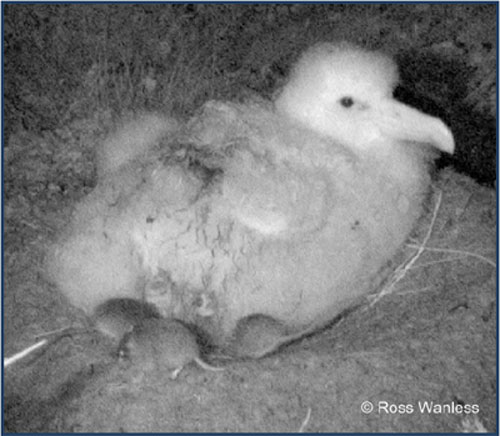The first Southern Ocean island from which the alien House Mouse Mus musculus has been eradicated was 700-ha Enderby Island in New Zealand's Auckland Island group. This 1993 effort was primarily directed at European Rabbits Oryctolagus cuniculus. A few years later, a similar poison-bait drop on France's Saint Paul Island failed at eradicating mice, although it did succeed in removing its rabbits and the Black Rat Rattus rattus.
Current attempts and plans to eradicate introduced mammals on Macquarie Island and South Georgia (Islas Georgias del Sur)* are primarily directed at rats (both islands), rabbits (Macquarie) and Reindeer Rangifer tarandus (South Georgia/Islas Georgias del Sur) but hope also to remove the mice. So far, the signs seem positive for both exercises but time will tell (click here).
See also http://www.ft.com/cms/s/2/eaaafb32-67f1-11e1-978e-00144feabdc0.html#axzz1pZFz2taV
Until relatively recently, introduced House Mice were not thought to have serious effects on seabirds on southern islands, although it was known they alter invertebrate populations. This view changed when it was discovered that House Mice on the United Kingdom's Gough Island are responsible for the deaths of many Tristan Albatross Diomedea dabbenena chicks every year. Research and planning is now proceeding towards an eradication exercise on the island (click here).
Since the Gough situation raised concerns, observations have been made of mice attacks on albatrosses at South Africa's sub-Antarctic Marion Island. As a consequence a review of mouse impacts on Marion has been submitted to the island group's management committee for consideration. This report recommends that a rodent eradication expert should visit the island in 2013 to conduct an eradication feasibility study - as has already been done for Gough. The outcome of such a study would help inform whether an eradication exercise should be attempted in the future.
It has been argued that where House Mice are the sole introduced small mammal, they may have more serious effects on birds than when not, in essence behaving like rats. Southern Ocean islands where House Mice are the only introduced mammal include New Zealand's Antipodes Island. To date, however, there are no reports of Antipodes mice affecting seabirds directly, although it has been shown they do impact the island's invertebrate fauna.
A mouse-free Southern Ocean is surely many years away, but no longer seems an impossible aim.

Tristan Albatross chick being attacked by House Mice at night on Gough Island
Selected References:
Angel, A. & Cooper, J. 2006. A review of the impacts of introduced rodents on the Islands of Tristan da Cunha and Gough (South Atlantic). RSPB Research Report No. 17. Sandy: Royal Society for the Protection of Birds. 64 pp.
Angel, A. & Cooper, J. 2012. A Review of the Impacts of the House Mouse Mus musculus on sub-Antarctic Marion Island, Prince Edward Islands. Report to the Prince Edward Islands Management Committee, South African National Antarctic Programme. Rondebosch: CORE Initiatives. 57 pp.
Angel, A., Wanless, R.M. & Cooper, J. 2009. Review of impacts of the introduced house mouse on islands in the Southern Ocean: are mice equivalent to rats? Biological Invasions 9: 1743-1754.
Christie, D. 2011. Introduced reindeer on South Georgia - their impact and management. Aliens 31: 24-29.
Cuthbert, R.[J.] & Hilton, G.[M.] 2004. Introduced house mice Mus musculus: a significant predator of threatened and endemic birds on Gough Island, South Atlantic Ocean? Biological Conservation 117: 483-489.
Cuthbert, R.J., Louw, H., Visser, P., Rexer-Huber, K., Parker, G.[C.] & Ryan, P.G. 2011. Preparations for the eradication of mice from Gough Island: results of bait acceptance trials above ground and around cave systems. In: Veitch, C.R., Clout, M.N. & Towns, D.R. (Eds). Island Invasives: Eradication and Management. Gland: World Conservation Union & Auckland: Centre for Biodiversity and Biosecurity. pp. 47-50.
Jones, M.G.W. & Ryan, P.G. 2010. Evidence of mouse attacks on albatross chicks on sub-Antarctic Marion Island. Antarctic Science 22: 39-42.
Marris, J.W.M. 2000. The beetle (Coleoptera) fauna of the Antipodes Islands, with comments on the impact of mice; and an annotated checklist of the insect and arachnid fauna. Journal of the Royal Society of New Zealand 30: 169-195.
McIntosh, A.R. 2001. The impact of mice on the Antipodes Islands. In: McClelland, P. (Ed.). Antipodes Island Expedition, October-November 1995. Invercargill: Department of Conservation. pp. 52-57.
Micol, T. & Jouventin, P. 2002. Eradication of rats and rabbits from St-Paul Island, French Southern Territories. In: Veitch, C.R. & Clout, M.N. (Ed.). Turning the Tide: the Eradication of Invasive Species. Gland & Cambridge: IUCN SSC Invasive Species Specialist Group, World Conservation Union. pp. 199-205.
Parkes, J 2008. A feasibility study for the eradication of House Mice from Gough Island. RSPB Research Report No.34. Sandy: Royal Society for the Protection of Birds. 52 pp.
Russell, J.C. 2012. Spatio-temporal patterns of introduced mice and invertebrates on Antipodes Island. Polar Biology DOI 10.1007/s00300-012-1165-8.
Torr, N., Golding, C. & Cuthbert, R.[J.] 2010. Preliminary Operational Plan for Eradicating House Mice from Gough Island. Version 1.0. Sandy: Royal Society for the Protection of Birds. 73 pp.
Wanless, R.M., Angel, A., Cuthbert, R.J., Hilton, G.M. & Ryan, P.G. 2007. Can predation by invasive mice drive seabird extinctions? Biology Letters 3: 241-244.
John Cooper, ACAP Information Officer, 20 March 2012
*A dispute exists between the Governments of Argentina and the United Kingdom of Great Britain and Northern Ireland concerning sovereignty over the Falkland Islands (Islas Malvinas), South Georgia and the South Sandwich Islands (Islas Georgias del Sur y Islas Sandwich del Sur) and the surrounding maritime areas.

 English
English  Français
Français  Español
Español